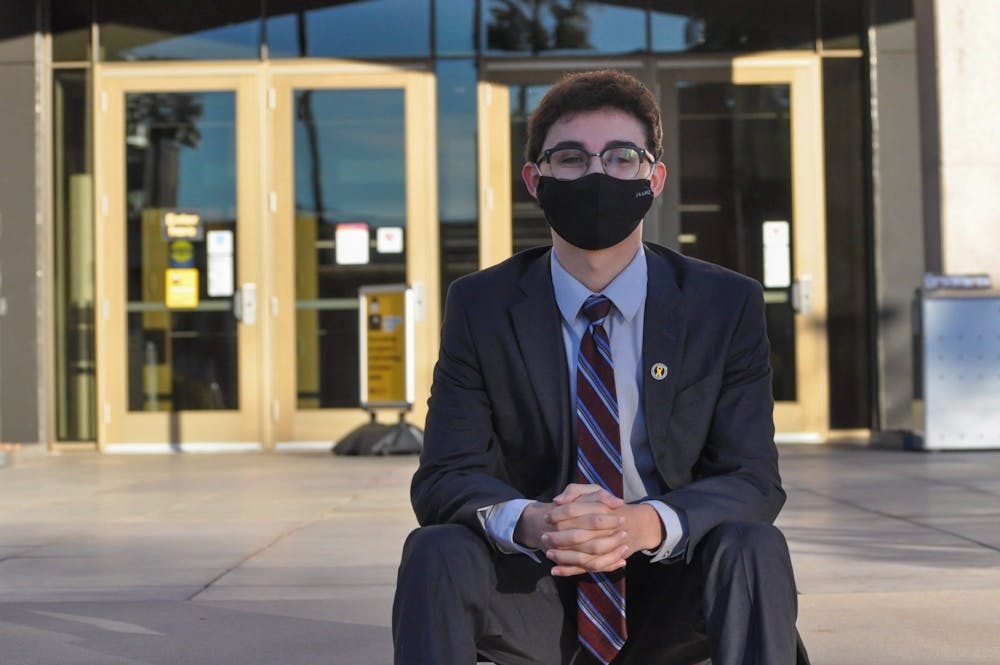Armando Montero, a senior studying political science, economics and math, ran for Tempe Union High School District governing board when he was 19 years old. He won the seat, becoming the youngest person elected to a Tempe school board at the time. Now, at 21, he is president of the board.
That position on the school board is where he first witnessed the impact of having young people in political leadership.
Montero said he thinks the same opportunities should exist at the Capitol. He is "incredibly excited" to see a bill at the Legislature that offers young people an opportunity to "bring a different perspective that really has never been in these decision-making bodies before."
"One of the main reasons I ended up running for office in the first place is because I do fundamentally believe that there should be more young people in our government representing the people of our age group who legally do not have representation in our state legislature at the moment," Montero said.
The Arizona Civic Participation Act would lower the age requirement to run for the state legislature from 25 to 18. It is a House concurrent resolution that would amend the state constitution, meaning if passed by the Legislature, it would go to the voters in the 2024 general election as a ballot measure.
Rep. Matt Gress, R-Phoenix, proposed the bill on Jan. 13 alongside the youngest members of each caucus, Reps. Cesar Aguilar, D-Phoenix and Austin Smith, R-Wittmann. It is co-sponsored by several other representatives and senators from both sides of the aisle.
Gress, a former teacher who first ran for office when he was 18 years old, called the legislation "another step in engaging our state's youth." He said in a press release it will align the state's legislative age requirements with the rest of the country.
Arizona is tied with Utah and Colorado for the highest age requirement to run for State House of Representatives — candidates must be 25, district residents for one year and state residents for three. In 18 states, the minimum age requirement to run for at least one chamber of the state legislature is 18.
Francisco Pedraza, an associate professor of political science, said the bill "can only help" increase participation.
Pedraza said he has high confidence in the positive effect of opening access to participation to more demographic groups, including younger ages. He said this expansion "almost never leads to a reduction in participation."
"The general understanding is, if you see somebody that looks like you running for office, it mobilizes you," Pedraza said.
Students who lead political organizations at the University support the proposed legislation.
Ryne Bolick, a junior studying mechanical engineering and College Republicans at ASU board member, said the resolution would give 18- to 24-year-old voters direct representation from their peers.
"If I were a voting member of the House or the Senate, I would vote for it just because I think it's pretty harmless," Bolick said. "It's not going to have a big impact because I do not see candidates who run in the lower age group, making it out of their primaries."
READ MORE: ASU sophomore becomes the youngest ever Tempe Union Governing Board member
Bolick was a member of former Gov. Doug Ducey's Youth Commission for two years. He said one positive of the bill is that "having people around my age would actually encourage younger people to kind of pay a little bit more attention."
Isabel Hiserodt, Young Democrats at ASU president and a sophomore studying political science, said some young people are already engaged in all levels of politics, and the resolution would give those young people more power.
"There's still exclusion at the public office level, where our voices can't really be heard to their fullest potential if we can't have young people running for these offices," she said.
She and other club members of Young Dems are "all in favor" of the bill, calling it a "great step to get young people and college students in and running for legislative positions."
"If the ground level organizing stuff is accessible to young people, and they're interested and they're doing the work, it's super important that they're able to access public office as well," Hiserodt said. "If their input and their work are so valued in getting people elected, why can't they be the ones to get elected?"
Montero said younger people are effected by issues like education, climate change, LGBTQ+ protections, and that young people have been "galvanized."
Young people, he said, should "never take no for an answer."
"Because if I listened to the people that consistently told me no the first time that I said that I was going to run for this board, I wouldn't be here," Montero said.
Edited by Shane Brennan, Reagan Priest, Piper Hansen and Anusha Natarajan.
Reach the reporter at tjgantz@asu.edu and follow @GantzTori on Twitter.
Like The State Press on Facebook and follow @statepress on Twitter.

Tori is a politics reporter covering voting rights, labor, and University Student Government Polytechnic at the State Press. They are currently working for the News Collab and Wick Communications to create the Voices Listening Project, a collaborative research project in Arizona funded by the Google News initiative.




